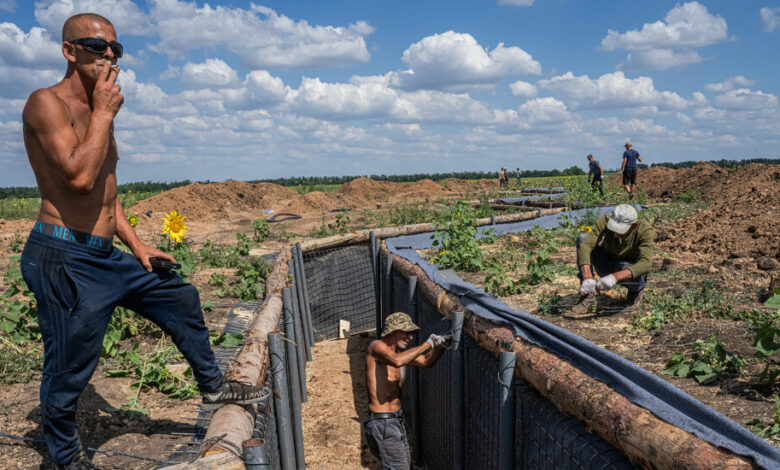US officials say it is unlikely that Russia will take much more Ukrainian territory

US officials say Russia is unlikely to make significant territorial gains in Ukraine in the coming months as its poorly trained forces struggle to break through Ukrainian defenses, which have now been reinforced with Western munitions.
In the spring and early summer, Russian forces attempted to seize territory outside the city of Kharkiv and resume an advance into eastern Ukraine, capitalizing on their capture of Avdiivka. Russia suffered thousands of casualties in the advance, while gaining little new territory.
Russia’s problems represent a significant change in the dynamics of the war, which has favored Moscow in recent months. Russian troops continue to hurt, but their gradual advance has been slowed by the hardened lines of the Ukrainians.
The coming months will not be easy for Ukraine. But allied leaders gathering in Washington this week for the 75th anniversary of the founding of the North Atlantic Treaty Organization can rightly claim that their efforts to strengthen Ukraine are working.
“Ukrainian forces are overstretched and face difficult months of fighting, but a major Russian breakthrough is now unlikely,” said Michael Kofman, a senior fellow in the Russia and Eurasia Program at the Carnegie Endowment for International Peace, who recently visited Ukraine.
Leaders at the summit are expected to pledge new funding for Ukraine, announce plans to coordinate arms transfers across the alliance and reinforce a pledge to Kiev that the country will eventually become a full-fledged ally.
It is that last point that has become the focus of the war, more important even than regaining territory. While Ukrainian officials insist that they are fighting to get their country back, more and more American officials believe that the war is instead primarily about Ukraine’s future in NATO and the European Union.
The summit raises concerns about Russia’s acquisition of weapons – particularly missiles, drones and the parts to build them – from Iran, North Korea and China.
And three years into a devastating war, there are real concerns about Ukraine’s ability to keep its infrastructure, including its electrical grid, running during long-range Russian attacks.
But perhaps the biggest uncertainty of all is US policy toward Ukraine after this fall’s presidential election.
While Russia is unable to take large parts of Ukraine, the prospects that Kiev can retake more land from the invading army are also diminishing. Urged by American advisers, Ukraine is focusing on building up its defenses and attacking deep behind Russian lines.
Eric Ciaramella, a former intelligence official who is now an expert on Ukraine and works with Mr. Kofman at the Carnegie Endowment for International Peace, said it had become clear over the past 18 months that neither Russia nor Ukraine “has the capabilities to significantly change the lines of battle.”
The United States, Mr. Ciaramella said, has always defined its strategic goal as “a Ukraine that is democratic, prosperous, European and secure.” The United States and its allies will need to make long-term investments to enable Ukraine to hold its lines, wear down Russia and inflict damage, Mr. Ciaramella and current U.S. officials said.
“That is still a very unstable scenario,” Mr Ciaramella said. “That is why Western leaders really need to focus on integrating Ukraine into European and transatlantic security structures.”
The European Union agreed last month to open membership talks with Ukraine, a crucial step in the long accession process. While NATO is not yet ready to invite Ukraine to join, allied leaders are set to approve language this week that all but promises Kiev that it will be part of the alliance.
The statement is intended to prevent a repeat of what happened last year at the summit in Vilnius, Lithuania, where leaders declared that “Ukraine’s future lies with NATO” but did not follow up with a concrete invitation. Diplomats called the complicated language a “word salad,” and Ukrainian President Volodymyr Zelensky angrily complained about the lack of a timetable for membership.
The possibility of Ukraine joining NATO seemed remote before the Russian invasion in 2022. Allies were reluctant to provoke Russia or make a seemingly major security commitment. Since then, Ukraine’s partnership with the United States, Britain and other European countries has strengthened, and the West has poured billions of dollars into training and equipping the Ukrainian military.
Keeping Ukraine out of NATO has been a goal of Russian President Vladimir V. Putin since he started the war, a goal ironically made more possible by his invasion. Peace talks in April 2022 collapsed when Moscow insisted on neutrality for Ukraine and a veto on all outside military aid.
Since then, Ukraine has become even more committed to European integration.
Russia seized the most pro-Russian parts of Ukraine in the first year of the war. U.S. officials say privately that it will be nearly impossible for Ukraine to regain all of its territory, but that it could push for greater European integration if its battlefield performance is stronger.
Some officials say that even without formally regaining territory, Ukraine could still emerge victorious from the war by moving closer to NATO and Europe.
The officials interviewed for this article spoke anonymously about secret military and intelligence assessments, battlefield positions and sensitive diplomacy.
U.S. officials acknowledge that Russia could make significant progress if it made a major strategic shift, such as expanding its military conscription and training programs.
Their predictions would also be undermined if US policy toward Ukraine and Russia changed.
Under the Biden administration, the United States has provided military advice, real-time intelligence and billions of dollars in weapons.
Former President Donald J. Trump has promised that if elected, he will initiate peace negotiations between Russia and Ukraine. He has not yet announced what peace terms he is seeking, but swift negotiations would likely force Ukraine to cede large swaths of territory and abandon its ambitions to join NATO.
But officials say it would be a mistake to demand that negotiations begin now. About $61 billion in aid approved by Congress in May after months of wrangling will bolster Ukraine’s defenses and halt Russia’s territorial advances.
During the war, U.S. intelligence agencies were far more pessimistic about the prospects than the Pentagon, whose senior officers worked closely with the Ukrainian military to help develop the strategy. But assessments within the U.S. government now appear to be more aligned about Russia’s prospects on the battlefield.
With electronic components from China, drones from Iran, and missiles and artillery from North Korea, Russia has secured enough weapons to supply its military.
But there is not enough staff to make a significant breakthrough.
Lara Jakes And Anton Trojanovski contributed to the reporting.




